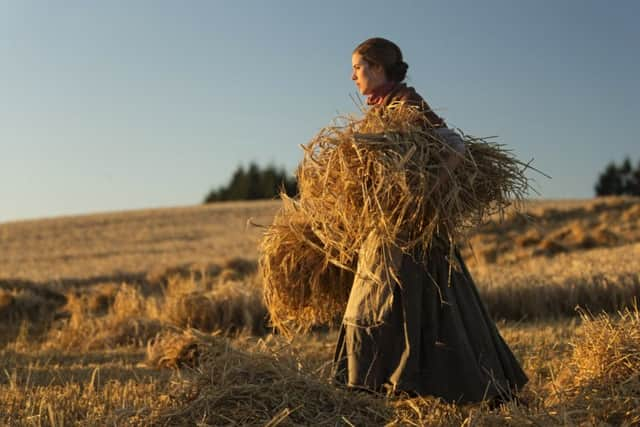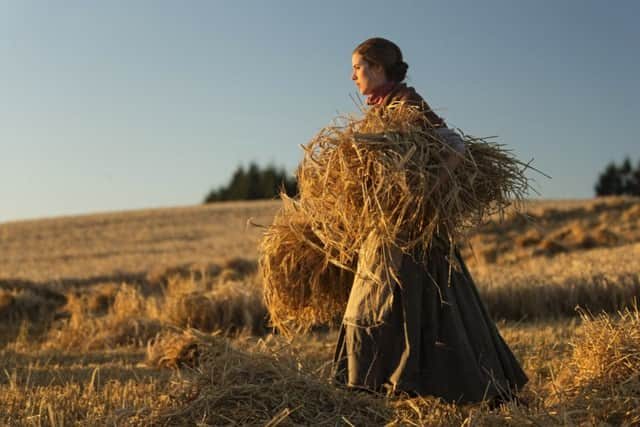Film review: Sunset Song (15)


Sunset Song (15) | Rating: **** | Directed by: Terence Davies | Starring: Agyness Deyn, Peter Mullan, Kevin Guthrie, Daniela Nardini
Like Under the Skin before it, a big screen adaptation of Lewis Grassic Gibbon’s Sunset Song has been in development for so long the very sight of it on a cinema screen almost comes as a shock. A long-cherished project for Terence Davies, who shot his acclaimed Edith Wharton adaptation House of Mirth in Glasgow, but was subsequently unable to get another project (including this one) off the ground until his transcendent cine-essay Of Time and the City in 2008, it’s a testament to his tenacity that he’s stuck with it this long.
Advertisement
Hide AdThat he’s made something worthy of his own back-catalogue makes it a bit of a relief too, his cinematic lyricism elevating Gibbon’s book above the miserablist tropes to which too many Scottish films default. Not that those tropes aren’t also present. Set in rural Kincardineshire on the eve of the First World War, the film is plenty harsh, particularly in its depiction of familial dysfunction and patriarchal oppression (embodied here by a typically menacing Peter Mullan). This in itself might upset viewers who perhaps remember Gibbon’s florid descriptions of the land and the characters’ subconscious thoughts, but not the emotional and physical violence contained therein.


But this tale of a bookish farm girl whose unbreakable connection to the land thwarts her desire to live a more educated life is not as dour as its protagonist’s initial fate might suggest. In part that’s down to the way Davies, working with Paisley-born cinematographer Martin McDonough (Winter’s Bone, Starred-Up) captures both the sun-kissed beauty and hardscrabble nature of the environment. (The film was shot in Scotland, Luxembourg and New Zealand.) This gives the film a plaintive and melancholic feel, but a hopeful one too, its sadness cathartic and appropriate for a story with such a bittersweet view of its setting. The Scotland of Sunset Song is, after all, one of contradictions, existing at a moment in time when those clinging to habitual views of the past are reckoning with a new generation whose imagined futures are already in the process of being undercut by external forces.
Gibbon’s heroine, Chris Guthrie, is part of that new generation and it’s a cruel irony that the very industrialisation that will offer her the possibility of a better life also has the potential to hasten her obsolescence in far swifter fashion than anything faced by her forebears. This is reflected in the way Davies structures the film, hurrying through the trauma of war after a long, slow build-up.
Which isn’t to say Chris’s own modest ambition before that to become a schoolteacher isn’t also quickly eradicated. Family tragedy looks set to condemn her to life with a brutal father (Mullan) whose insistence on his conjugal rights have taken an unbearable toll on her mother (Daniela Nardini, etching a lifetime of hurt and subjugation on her character’s face in a few short scenes). Yet there’s also something of Thomas Hardy’s Bathsheba Everdene in Chris – another young woman in unenlightened times who comes to assert her independence as a matter of course. Like Bathsheba she’s resourceful and resilient and as attuned to her interior life as she is to the reality of the farmland she has to work.
Relative newcomer Agyness Deyn proves a worthy choice for the role of Chris. Though Davies often deploys poetic voiceover to tap into Chris’s interior life, Deyn has an intriguing blend of earthiness and exoticism that perfectly reflects the warring impulses driving Chris: she seems both of the land and apart from it and she makes it easy to believe Chris would draw survival lessons from nature, particularly when illness incapacitates her father and offers her a tantalising glimpse of a future without this monster.
As seen in his debut feature Distant Voices, Still Lives, Davies is sensitive to the depiction of female characters battling through abusive relationships and he finds ways here to evoke the full impact of what’s happening without letting it overwhelm the film. Deyn’s ability to internalise Chris’s defiance aids Davies immeasurably. As Chris gains some independence and starts to thrive in the world, Deyn makes Sunset Song seem almost dreamlike – albeit in a way that seems designed to set up the heartbreak of the final act.
Advertisement
Hide AdShe’s complemented by Kevin Guthrie’s performance as Ewan, the young man whose sweetness wins over Chris before the calamity of war tears him apart, destroying all that’s good in the life they’ve just started building together. Davies hints at this coming chaos throughout and sums up its effect with a drifting overhead shot of No Man’s Land that’s devastating and beautiful and full of irony – its expected significance subverted by a further revelation that sets Chris free while rooting her forever to the land, her burden now a source of strength.